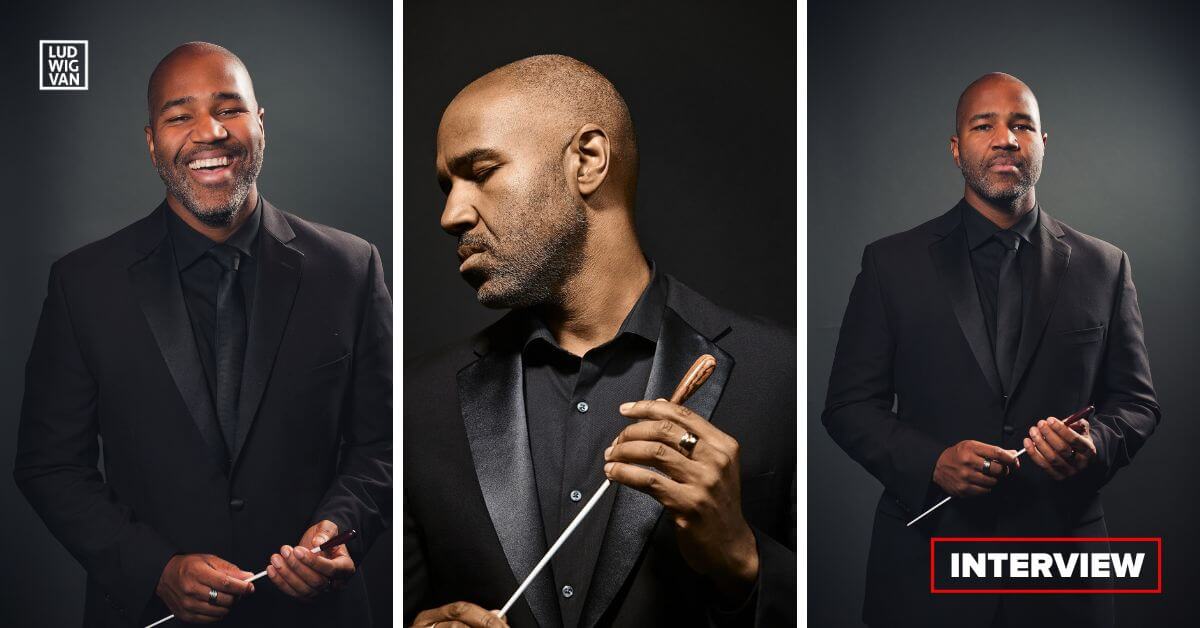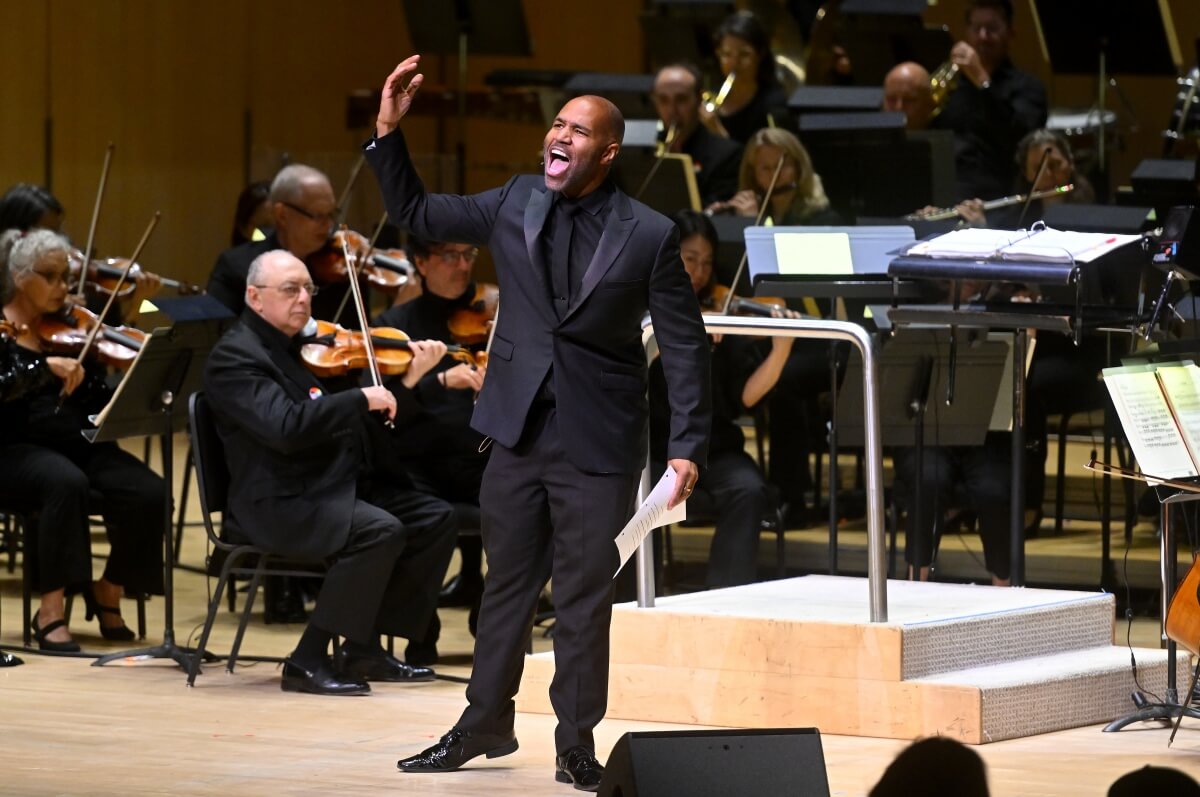
“I knew that I wanted to conduct orchestras, and that’s it,” says Daniel Bartholomew-Poyser of his early musical ambitions. It’s a common start, but one that has in his case led to an uncommon career, one with a reach that extends across North America.
With a Bachelor in Music Performance and Education from the University of Calgary and a Master of Philosophy in Performance from the Royal Northern College of Music in Manchester, England, he began his career as a teacher.
“I never dreamed that I would be on staff at the Toronto Symphony Orchestra,” he says.
Today, Daniel Bartholomew-Poyser is a familiar figure to Toronto’s classical music audiences, but they may not be aware of the full extent of his professional practice.
The Barrett Principal Education Conductor & Community Ambassador of the Toronto Symphony Orchestra, Daniel is also the Principal Youth Conductor and Creative Partner of the National Arts Centre Orchestra, Artist in Residence and Community Ambassador of Symphony Nova Scotia, and Resident Conductor of Engagement and Education of the San Francisco Symphony.
That’s just the tip of the iceberg when it comes to the number and range of orchestras he’s worked with. He is also host of a weekly radio show on the CBC.
It is, of course, a career with an underlying theme, one that extends the real of orchestral music beyond the formality of the concert hall and into the community, as well as bringing imaginative programming back into the concert hall.
The Orchestra Is An Institution
The news, in general, has not been so great over the last year when it comes to orchestras in Canada, or even internationally.
“One of the things to note is that, every decade, there’s a new reason why orchestras are in peril. Yet, every decade, orchestras continue to work and function,” he notes.
Culture changes and transforms, leaving all institutions in the perpetual position of having to both maintain operations and they grow/change with the times.
“It’s serious, but also normal,” he notes. “I think orchestras are thinking right now about ways that they can bring special value to people closest to them.” As he points out, that will look different for each orchestra and the community they serve. It’s a challenge, but a rewarding one. “It’s joyful work.”
In his work with different orchestras, he finds common threads.
“What makes something relevant is the degree to which it matters to people who are actually present,” he says, noting there are many ways that orchestras can respond to the call for relevance. “Who do the people in the community want to see on stage?”
He notes that diversity includes not just what people look like, but social, locational, and economic diversity. “Who’s listening, and who’s deciding — how do we treat each other as we go about this? Do the musicians look like people in our community?”
The concerts he’s led have woven reggae into an orchestral setting, and a Gaelic festival, “Johnny Cash along side Beyoncé alongside Reena Esmail” as he describes it. “Are we including prison audiences? Are we including kids on the spectrum?”
Programmers, and others who operate behind the scenes of a concert, play a key role, and also need to listen to and represent community interests. “It’s possible to do all this work, and leave all [participants] empty,” he says. “It’s possible to do something imperfectly, but the mistake can be covered with grace and understanding — that makes the difference. It’s about relationships ultimately.”
The Orchestra In The Community
All forward-thinking orchestras are considering how the music is delivered, and ways that it can affect how the audiences experience the music. It’s not just about attracting new, younger audiences, but also deepening relationships with the core audience.
The TSO is big enough to take some risks and experiment how the music is delivered. “The content of the music making is going to be world class, if we’re talking about the Toronto Symphony Orchestra,” he notes.
“It’s not just about new people. The people who are also part of our family, this is also about them,” he explains. “They’re ultimately the judge of it.”
It takes ingenuity and creativity to consider how to reach audiences in new ways. That’s the impetus behind initiatives like the TSO’s upcoming event with Song Exploder that delves into Stravinsky’s Rite of Spring.
“It’s not a new direction, it’s an expansion,” he says. “I think Gustavo’s project is going to be phenomenal.” It will appeal to existing fans of the work as well as those who know nothing about it.
Outreach programs and different delivery methods, they all have the same goal: expanding the reach of orchestras as they acknowledge the role it can play.
“A big factor [is] community building.”
Those shared moments when an audience is united — and science tells us that we tend to sync physically with the music, along with the feeling of being emotionally transported — aren’t inconsequential.
“That’s a very powerful unifying moment,” he says. “People know that, and that’s why they keep coming back.”

Orchestras Are The Future
Daniel’s upcoming plans take him on the road. This month, he’s back in the Maritimes to conduct a program of Gershwin with Symphony Nova Scotia.
He’ll be making his debut with the New York Philharmonic in April, conducting one of their signature Young People’s Concerts. The performance is part of the 100th anniversary celebrations for the Young People’s Concerts series, and takes place at David Geffen Hall at NYC’s Lincoln Center.
In May, 10,000 students drawn from New York City and are will participate in concerts at Carnegie Hall with Bartholomew-Poyser as conductor for the mass ensemble. It’s part of the city’s Link Up Music Education Program. True to his own philosophy of programming, the concert will include works produced from a season-long Women In Music Focus initiative, along with music from all over the world.
Recently, Bartholomew-Poyser began working with Sistema Toronto as part of the TSO’s new partnership with the non-profit music education program. It’s a workshop he was happy to lead. “You have to water the roots. That’s what that’s about,” he says. “It was really great to go out and see how fast they work.” He mentions the real passion and hard work he saw both in the students and teachers of the program.
“The joy on the kids’ faces,” he recalls. Sistema’s success is proof of the power of music — and its universality.
“Anybody can play an instrument.”
Are you looking to promote an event? Have a news tip? Need to know the best events happening this weekend? Send us a note.
#LUDWIGVAN
Get the daily arts news straight to your inbox.



